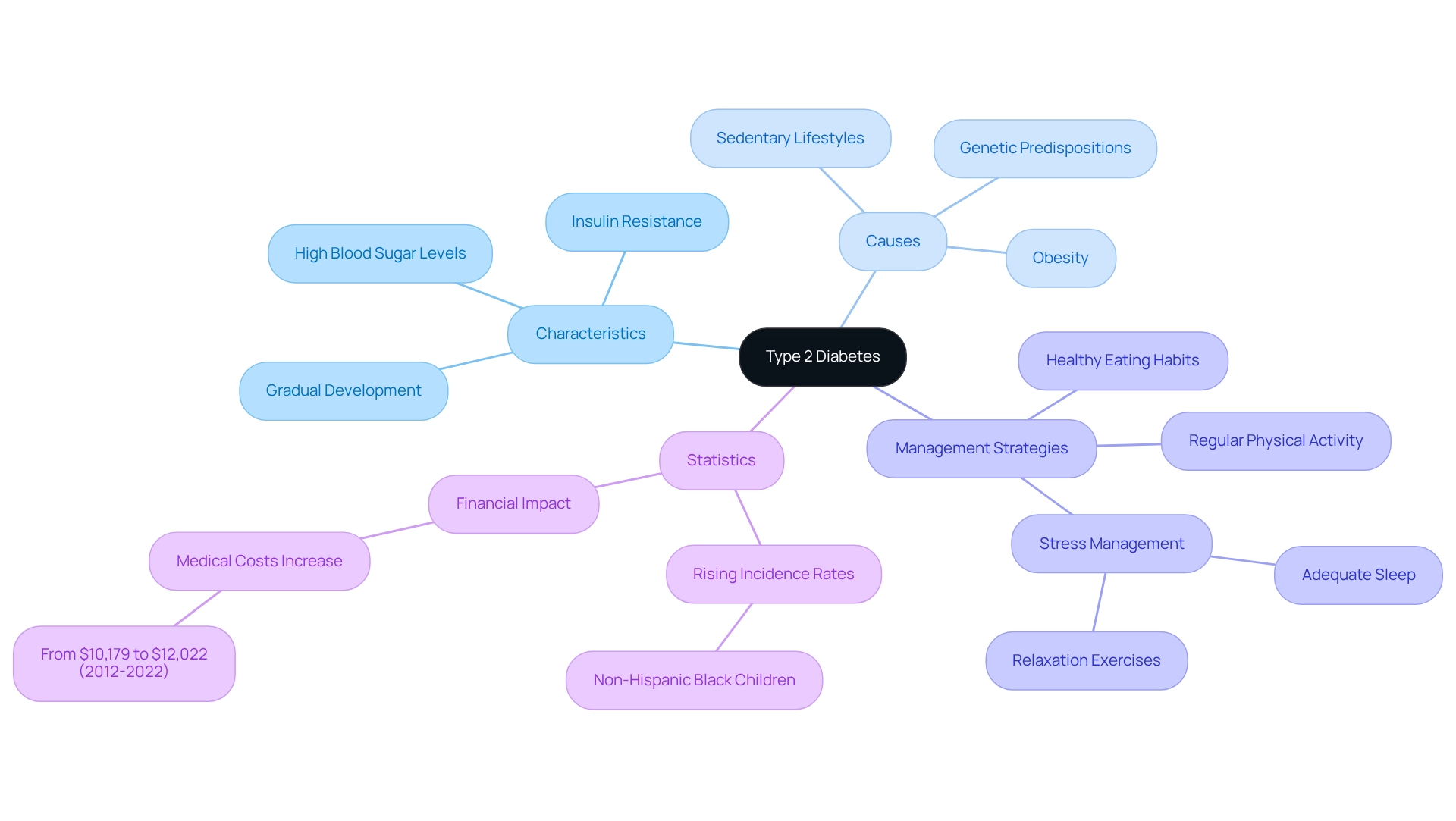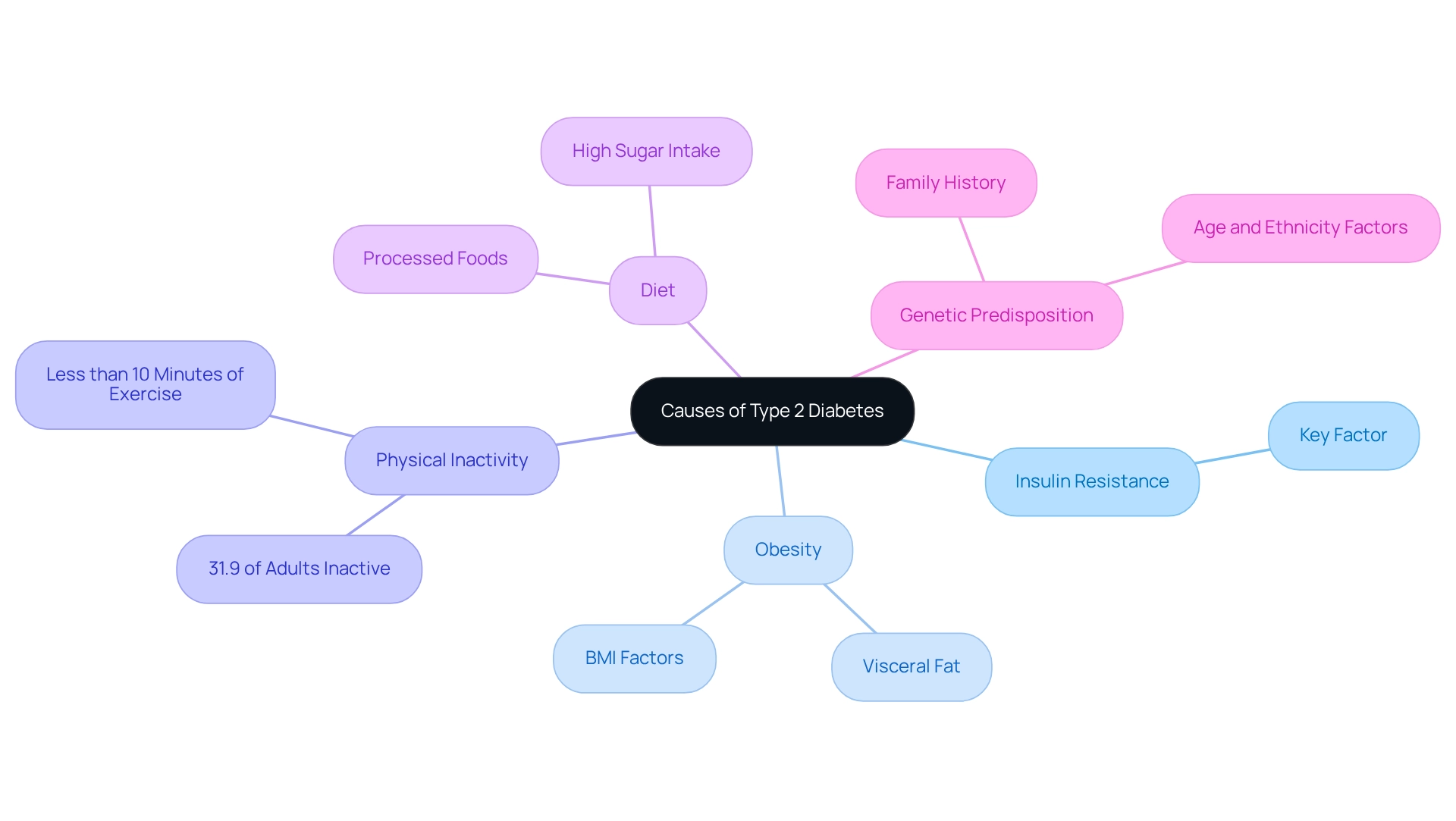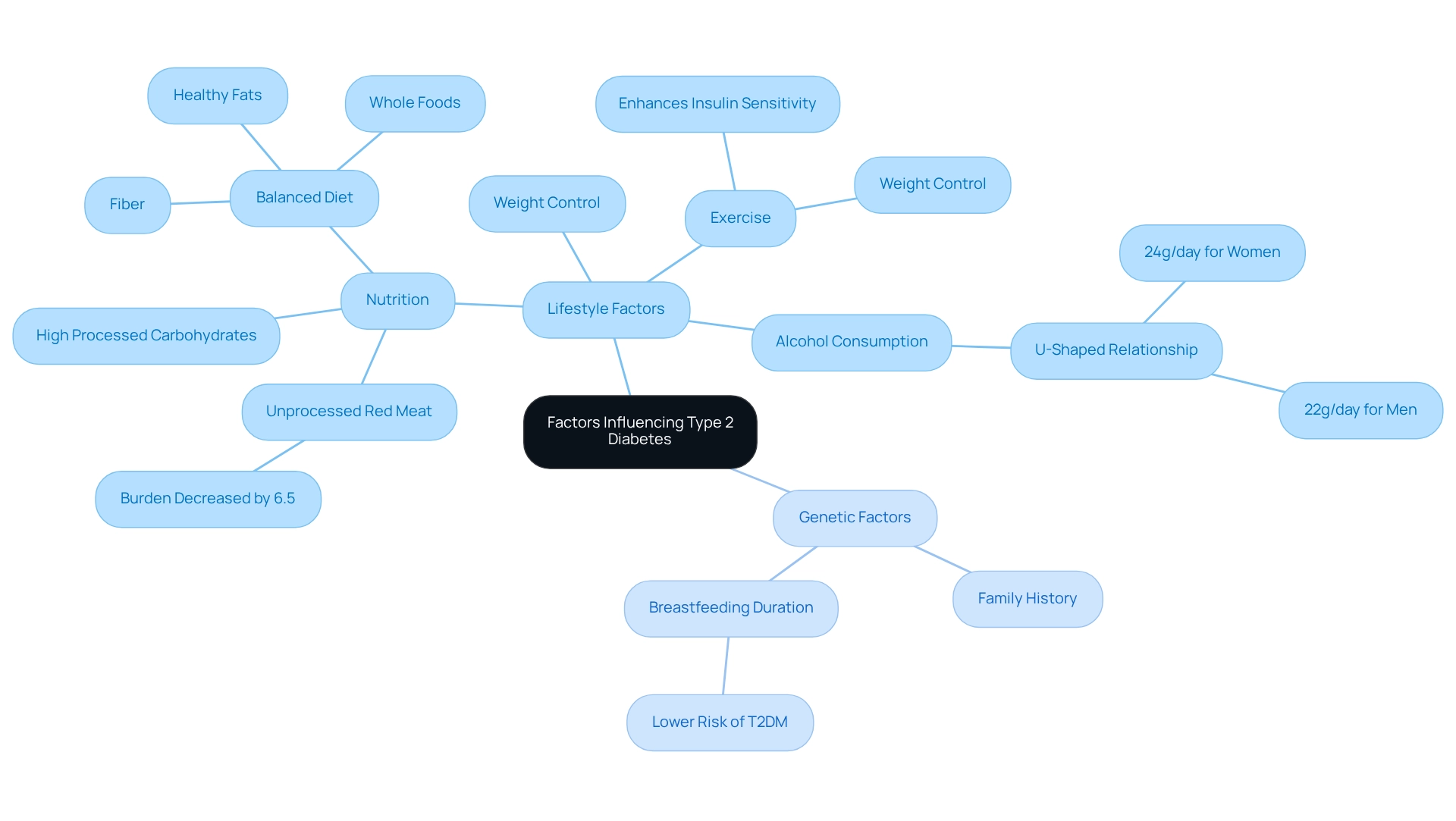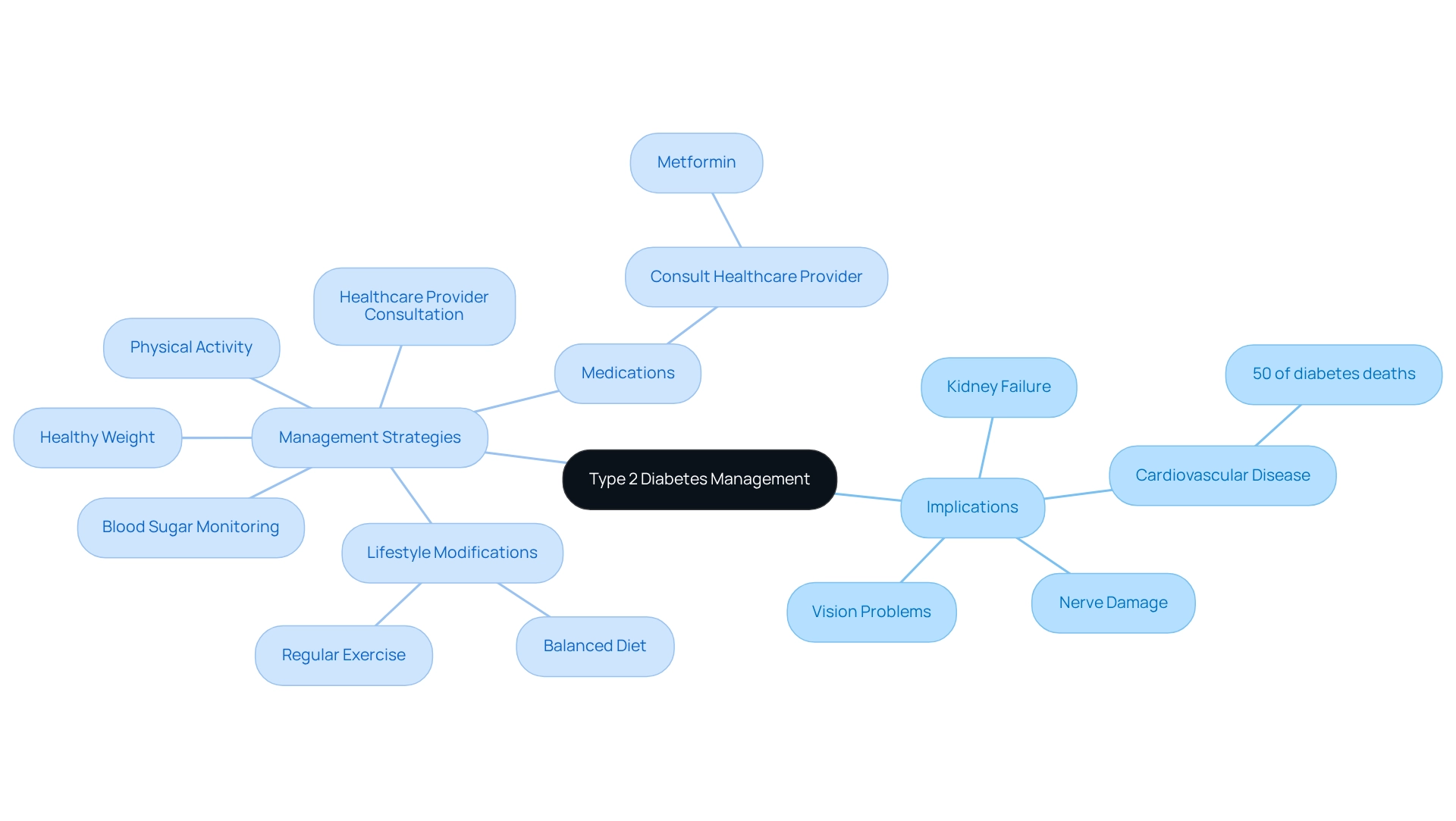Overview
Type 2 diabetes in adults can often stem from several key factors, including insulin resistance, obesity, physical inactivity, and genetic predispositions. It's important to recognize how these elements intertwine with our daily choices. Lifestyle decisions, such as what we eat and how much we move, play a crucial role in shaping our insulin sensitivity and overall well-being.
Understanding this connection can feel daunting, but you're not alone in this journey. Many have navigated similar paths and found ways to manage their health proactively. By focusing on education and support, we can empower ourselves to make informed choices that positively impact our lives.
If you're feeling overwhelmed, consider seeking resources or communities that can provide guidance and encouragement. Remember, taking small steps toward healthier habits can lead to significant improvements in your health. Together, we can address this growing health issue with compassion and understanding.
Introduction
In a world where Type 2 Diabetes is becoming increasingly common, understanding this chronic condition is more important than ever. Characterized by insulin resistance and elevated blood sugar levels, Type 2 Diabetes can lead to serious health issues, such as cardiovascular disease and kidney failure. As T2DSolutions emerges as a beacon of hope for those facing diabetes, it provides essential resources for education and management.
It's understandable to feel overwhelmed by the lifestyle choices, genetic factors, and the rising economic burden of diabetes. This article explores the complexities of the condition, emphasizing the importance of proactive management and community support. Through a thoughtful examination of the causes, implications, and effective strategies for living well with diabetes, we invite you to discover how informed choices can lead to better health outcomes amidst this growing epidemic. Remember, you're not alone in this journey; we are here to support you every step of the way.
Define Type 2 Diabetes: Understanding the Condition
Condition 2 of diabetes is a long-term metabolic issue characterized by high blood sugar levels due to insulin resistance and insufficient insulin production. Unlike the first form, where the body cannot generate insulin, individuals with the second form can still produce insulin, but their bodies do not use it effectively. This condition typically develops gradually and is closely linked to factors such as obesity, sedentary lifestyles, and genetic predispositions, which are important in understanding what causes type 2 diabetes in adults.
As T2DSolutions launches as a new resource center for education and management related to this condition, it aims to provide essential support for newly diagnosed patients. Understanding the traits and signs of the second type of diabetes is crucial. Uncontrolled instances can lead to serious complications, such as heart disease, kidney failure, and neuropathy. It's understandable to feel overwhelmed, but stress management plays a critical role in blood sugar control. Strategies like regular physical activity, adequate sleep, and relaxation exercises can significantly enhance glucose control, as emphasized in the case study titled "Stress Management in Diabetes Care."
Recent statistics indicate that the occurrence of the second type of glucose intolerance continues to rise, with significant implications for public health. In 2025, it is projected that millions of adults will be affected globally, underscoring the urgent need for effective management strategies. The International Diabetes Federation (IDF) states that the additional medical expenses linked to this health issue have risen from $10,179 to $12,022 per individual between 2012 and 2022, highlighting the increasing financial strain of this condition.
Practical examples demonstrate the significance of lifestyle changes in managing the second type of diabetes. Individuals who adopt healthier eating habits and engage in regular exercise often experience better health outcomes. Additionally, recent research shows that non-Hispanic Black children demonstrate the highest occurrence of a specific metabolic condition, emphasizing the necessity for focused interventions in at-risk groups.
In summary, understanding what causes type 2 diabetes in adults is a complex issue influenced by various factors, and a comprehensive understanding is vital for effective management and prevention of complications. T2DSolutions is dedicated to offering educational materials, community assistance, and specialist guidance to help you manage your health journey. Remember, you're not alone in this journey. The statistics and information presented are based on the latest research and reports, reinforcing the importance of staying informed about this growing health issue.

Identify Key Causes of Type 2 Diabetes in Adults
Understanding what causes type 2 diabetes in adults often involves recognizing that it stems from insulin resistance, which means the body's cells are less responsive to insulin, along with insufficient insulin production by the pancreas. It's important to recognize that obesity, particularly visceral fat accumulation around the abdomen, is a major factor in what causes type 2 diabetes in adults. Current statistics reveal that 8.0% of U.S. adults diagnosed with this condition have non-HDL cholesterol levels of 190 mg/dL or higher. This statistic highlights the metabolic challenges faced by this group, as elevated non-HDL cholesterol is frequently associated with increased cardiovascular risk and complicates blood sugar management, contributing to what causes type 2 diabetes in adults; physical inactivity is another critical factor to consider. Recent research indicates that 31.9% of adults experiencing blood sugar issues report being physically inactive, defined as engaging in less than 10 minutes of moderate or vigorous exercise each week. This lack of activity can create a substantial barrier to effectively managing blood sugar levels and overall health. Regular exercise is essential for enhancing insulin sensitivity and maintaining a healthy weight, and it's understandable to feel overwhelmed by these recommendations.
Diet plays a pivotal role as well; a diet rich in processed foods and sugars can worsen insulin resistance. Understanding what causes type 2 diabetes in adults includes recognizing that genetic predisposition is significant, as individuals with a family history of the condition may face a higher risk. Other contributing factors include age, ethnicity, and comorbid conditions such as hypertension and high cholesterol.
Recent research underscores the importance of addressing these risk factors. For instance, a study found that among patients with a BMI of 35 or higher who underwent metabolic surgery, 85% maintained remission from their condition for up to two years. This is in stark contrast to those who received only medical therapy. Such findings highlight the potential for surgical interventions in managing obesity-related diabetes, emphasizing the need for comprehensive treatment approaches, as experts stress that understanding what causes type 2 diabetes in adults is vital for prevention and management. Endocrinologists note that insulin resistance is a key factor in the onset of Type 2 Diabetes, making it essential to address lifestyle elements promptly. By recognizing these key causes and contributing factors, you can take proactive steps toward managing your health effectively. Remember, you're not alone in this journey. Increasing awareness on World Diabetes Day serves as a reminder of the importance of education and community support in navigating the challenges of this illness. By sharing knowledge and experiences, we can foster a supportive environment that encourages healthier lifestyles and better health outcomes.

Examine Lifestyle and Genetic Factors Influencing Type 2 Diabetes
Lifestyle elements such as nutrition, exercise, and weight control are vital in understanding what causes type 2 diabetes in adults. It's important to recognize that diets high in processed carbohydrates and sugars can lead to weight gain and insulin resistance, which are significant contributors to what causes type 2 diabetes in adults. On the other hand, regular physical activity can enhance insulin sensitivity and help maintain a healthy weight, which is crucial for prevention.
For instance, a meta-analysis revealed a U-shaped connection between alcohol consumption and the likelihood of developing diabetes. This suggests that moderate intake—approximately 24 grams daily for women and 22 grams for men—might be linked to a reduced risk. Additionally, recent statistics show that the burden of excess unprocessed red meat has decreased by 6.5% in Central and Eastern Europe and Central Asia, highlighting the importance of dietary choices in managing health concerns.
Genetic predisposition also plays a significant role. If you have a family history of the condition, you may be at an increased risk. This genetic factor can interact with lifestyle choices, which are important in understanding what causes type 2 diabetes in adults. Notably, a study found that longer breastfeeding durations were associated with a lower likelihood of Type 2 Diabetes, suggesting that early life dietary habits can have lasting impacts. This underscores the importance of considering both genetic and lifestyle factors in diabetes prevention.
Moreover, current data indicates that physical activity levels are crucial in diabetes prevention. Engaging in consistent physical activity not only helps control weight but also reduces the risk associated with genetic factors. Nutritionists emphasize that adopting a balanced diet rich in whole foods, fiber, and healthy fats can significantly lower what causes type 2 diabetes in adults. If you are currently taking metformin, it’s advisable to consult with a healthcare provider for guidance on continuing or changing your medication.
By understanding these lifestyle influences, you can make informed choices that promote better health outcomes. As highlighted in a recent publication in Nature Medicine, the contributions of peer-reviewed research are essential in shaping our understanding of risk factors for diabetes. As T2DSolutions launches as a new resource hub for education on health conditions, we invite you to subscribe for updates on valuable information and resources that can assist you in managing your health journey. Remember, you're not alone in this journey; we are here to support you every step of the way.

Discuss Implications and Management of Type 2 Diabetes
Understanding what causes type 2 diabetes in adults is crucial, as the implications can be profound, leading to serious complications such as cardiovascular disease, nerve damage, kidney failure, and vision problems. It's understandable to feel overwhelmed by these potential risks. Statistics indicate that uncontrolled blood sugar levels substantially raise healthcare expenses, with additional medical costs per individual increasing from $10,179 in 2012 to $12,022 in 2022. This underscores the critical need for effective management strategies to mitigate these risks.
Effective management addresses what causes type 2 diabetes in adults by incorporating a multifaceted approach, including:
- Lifestyle modifications like adopting a balanced diet
- Engaging in regular physical activity
- Maintaining a healthy weight
- Monitoring blood sugar levels
- Following prescribed medications
- Discussing treatments with healthcare providers about options like metformin
These are essential aspects of managing what causes type 2 diabetes in adults. For instance, in 2020, there were 267,000 emergency department visits for hyperglycemic crises among adults with diabetes, highlighting the urgent need for improved management and education to prevent acute complications.
T2DSolutions serves as a valuable resource hub for individuals managing Type 2 Diabetes. Education and support from healthcare providers, particularly Certified Diabetes Educators, play a crucial role in enhancing an individual's ability to manage their condition effectively, especially in understanding what causes type 2 diabetes in adults. As one management specialist in blood sugar conditions notes, "A proactive approach to managing this disorder can significantly lower the risk of complications." As we move into 2025, the effectiveness of current management strategies continues to evolve, with a focus on personalized care plans that address individual needs and circumstances.
Real-life examples of successful lifestyle modifications demonstrate the potential for positive outcomes. Individuals who incorporate regular exercise and balanced nutrition into their daily routines often report improved blood sugar control and overall well-being. By fostering a supportive environment and encouraging open communication with healthcare professionals, individuals can navigate their diabetes journey with greater confidence and resilience. Remember, you're not alone in this journey; T2DSolutions is committed to providing the necessary tools and support to help you implement these management strategies effectively.

Conclusion
Type 2 Diabetes is a complex and increasingly prevalent condition that deserves our attention and proactive management. This article has delved into various aspects of the disease, including its roots in insulin resistance, lifestyle choices, and genetic factors. Understanding these underlying issues is crucial, as they directly influence the risk of developing diabetes and the effectiveness of management strategies.
Effective management goes beyond medical intervention; it embraces lifestyle modifications such as adopting a balanced diet, engaging in regular physical activity, and monitoring health metrics. The significant rise in healthcare costs associated with unmanaged diabetes highlights the importance of a comprehensive approach to care that includes education and community support. T2DSolutions serves as a vital resource, offering the information and tools necessary to empower individuals in their diabetes management journey.
As Type 2 Diabetes continues to impact millions globally, it is essential to focus on informed choices and supportive environments. By fostering awareness and encouraging healthy habits, individuals can mitigate risks and improve their health outcomes. It's understandable to feel overwhelmed, but with the right resources and community backing, navigating the complexities of diabetes is possible with confidence and resilience. Remember, you're not alone in this journey; we are here to support you every step of the way.
Frequently Asked Questions
What is Condition 2 of diabetes, also known as type 2 diabetes?
Type 2 diabetes is a long-term metabolic issue characterized by high blood sugar levels due to insulin resistance and insufficient insulin production. Individuals with this condition can still produce insulin, but their bodies do not use it effectively.
What factors contribute to the development of type 2 diabetes?
Type 2 diabetes typically develops gradually and is closely linked to factors such as obesity, sedentary lifestyles, and genetic predispositions.
Why is understanding the traits and signs of type 2 diabetes important?
Understanding the traits and signs of type 2 diabetes is crucial because uncontrolled instances can lead to serious complications, such as heart disease, kidney failure, and neuropathy.
What role does stress management play in blood sugar control for individuals with type 2 diabetes?
Stress management plays a critical role in blood sugar control. Strategies like regular physical activity, adequate sleep, and relaxation exercises can significantly enhance glucose control.
What are the current statistics regarding the prevalence of type 2 diabetes?
The occurrence of type 2 diabetes continues to rise, with projections indicating that millions of adults will be affected globally by 2025.
How have medical expenses related to type 2 diabetes changed over the years?
According to the International Diabetes Federation (IDF), the additional medical expenses linked to type 2 diabetes have risen from $10,179 to $12,022 per individual between 2012 and 2022.
What lifestyle changes can help manage type 2 diabetes?
Adopting healthier eating habits and engaging in regular exercise can lead to better health outcomes for individuals with type 2 diabetes.
Are there specific populations at higher risk for type 2 diabetes?
Recent research indicates that non-Hispanic Black children demonstrate the highest occurrence of specific metabolic conditions, highlighting the necessity for focused interventions in at-risk groups.
What resources does T2DSolutions provide for managing type 2 diabetes?
T2DSolutions offers educational materials, community assistance, and specialist guidance to help individuals manage their health journey related to type 2 diabetes.



